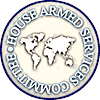


| For
Immediate Release: March 4, 2004 |
Contact: |
Harald Stavenas |
Opening Statements of Chairman
Jim Saxton
Hearing on Department of Defense Responsibilities in Homeland Defense and Homeland Security Missions
The Subcommittee on Terrorism, Unconventional Threats and Capabilities meets this afternoon to follow up on the topic of this subcommittee's very first hearing almost one year ago-an overview of the role of the Department of Defense in homeland security and homeland defense missions. Since that initial subcommittee hearing on March 13th of last year, our distinguished ranking member, Marty Meehan of Massachusetts, other members of the subcommittee and I have participated in a great many hearings, briefings, and meetings covering a wide variety of subjects. Some involved large policy issues, and others arcane technical issues, but all were important in their own way. And we haven't confined ourselves to Washington, but pursued an aggressive program to get to the field and see for ourselves. We've worked hard, learned a lot, and hope we have begun to contribute in some measure to making America and the rest of the world safer.
While we still have much to learn, it's time to revisit an issue we touched on last year when the responsible organizations were in their infancy. Now that the Office of the Assistant Secretary of Defense for Homeland Security, Northern Command, and the Department of Homeland Security have been in operation for the more than a year, it is a good time to check progress and see if there are issues that Congress needs to address. As I stated in that initial hearing, Secretary McHale's office, Northern Command, and the use of the national guard in homeland security and homeland defense missions are part of this subcommittee's natural jurisdiction, and we will take a continuing interest in your progress.
The subcommittee was interested to receive two recent reports published by the Department of Defense relevant to today's hearing. First is a report to Congress issued in September 2003, and the second is a Defense Science Board report of November 2003. I was gratified to note that neither report glossed over the many challenges that face the Department and the nation. Given our experience as a new subcommittee, I understand how it is that initially new organizations identify problems and issues more rapidly than they can be solved. As the Defense Science Board report points out, there are many gaps that need to be filled and many new organizational relationships that must be exercised and refined.
There's one issue that neither report highlighted that concerns me. While I am sensitive to and sympathetic to the long standing restrictions on federal troops performing domestic law enforcement missions, I have to say that I am less than comfortable with the command and control mechanisms described in the September 2003 report to Congress. In describing how Northern Command and the Joint Staff would watch over national guard troops on title 32 status in an ongoing operation, the report states that Northern Command and the Joint Staff will have "insight" into national guard operations. Not exactly tight control, but in conformance with the law. I'm not saying that change is needed, but I am seeking forthright statements on the record that these command relationships will work effectively.
I also note that the reserve forces of the United States are undergoing force structure changes to better accommodate the demands of mobilization. If the Defense Science Board recommendations are followed, and I believe there is some indication they will be, the national guard will have a greater role to play in homeland defense and homeland security missions. I trust that these important activities have been accounted for in the ongoing rebalancing of reserve forces.
###
2120 Rayburn House Office Building
Washington, D.C. 20515
|
NEWSLETTER
|
| Join the GlobalSecurity.org mailing list |
|
|
|

